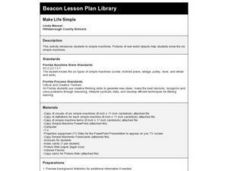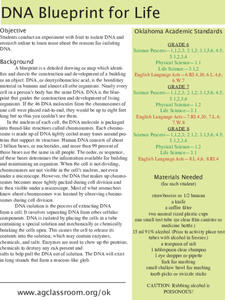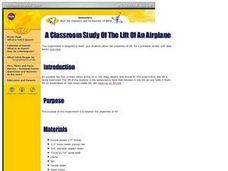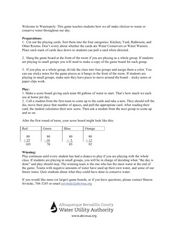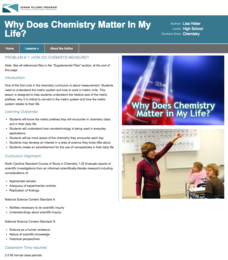Curated OER
Wetland in a Pan
Seventh graders build a watershed from various materials. In this life science lesson plan, the students will be able to change the design of their watershed to see the changes in the way the water will drain. Each group will be able to...
Curated OER
Become the Meteorologist
Seventh graders analyze the data from Hurricane Tracking maps. In this earth science lesson, 7th graders plot data points on their maps and predict where the storm will most likely hit. They compare their prediction with the actual storm...
Curated OER
Make Life Simple
Students examine six simple machines by looking at pictures of real world objects.
Curated OER
Life And Death
Students participate in an interactive game to review how living things are classified.
Curated OER
DNA Blueprint for Life
Did you know that meat tenderizers contain DNA cutting enzimes? Did you know that you can isolate your own DNA? Or the DNA of fruit? Explore with your learners the DNA world with a series of experiments using readily available materials...
Curated OER
A Clasroom Study of the Life of an Airplane
High schoolers participate in an experiment to discover the properties of lift. They work together to complete calculations and collect data. They share their results with the class.
Curated OER
Ocean Life Food Web
Students construct a food web representative of the Gulf of California. They use pictures to depict all of the organisms in the appropriate level of the web (producer, primary consumer, etc.)
Curated OER
Life in Ancient Mesopotamia
Learners reconstruct and make drawings of vessels in the same manner as an archaeologist. In this archaeologist lesson plan, students each get a piece of a broken pot and they have to work together to put it back together. Once it is...
Curated OER
Clean Water -- Life Depends on It!
Students examine water quality, water pollution, and water treatment, and how they are all interrelated. In this unit on clean water, students complete 21 interdisciplinary activities on water quality, water pollution, and water treatment.
Curated OER
Wateropoly: Life in the Desert
Learners explore water properties by participating in a drought related board game. In this water conservation lesson, students play a game titled "wateropoly" which is based on the classic board game Monopoly. Learners utilize cards and...
Curated OER
Marine Protected Areas (MPA)
Ninth graders explain the purpose of MPA's. In this biology lesson plan, 9th graders identify MPA's in Southern California. They simulate coastal sampling using candy from two buckets. Students analyze their results and share it with the...
Serendip
Soap Opera Genetics – Genetics to Resolve Family Arguments
Did she cheat on her husband? Did the hospital switch the babies? Should they have children? As much as this sounds like the plot for a soap opera, all of these questions fit into a single activity on genetics. Scholars read about three...
Kenan Fellows
How Do Chemists Measure?
Young chemists create gold nanoparticles as they learn to measure accurately with the metric system. They create an advertisement for the application of nanotechnology to complete the first lesson in a series of six.
NOAA
Fishy Deep-sea Designs!
Oceans represent more than 80 percent of all habitats, yet we know less about them than most other habitats on the planet. The instructor introduces the epipelagic, mesopelagic, bathypelagic, twilight, and midnight zones in the ocean....
Teach Engineering
Photosynthesis—Life's Primary Energy Source
Wouldn't it be great if you could produce your own food? Scholars learn about the processes of photosynthesis and cellular respiration in plants. They consider how to use photosynthesis as a model of an efficient system and how to apply...
Serendip
The Ecology of Lyme Disease
Areas that previously included no risk of Lyme disease now have cases every year. Scholars learn about the spread of Lyme disease and the relationship with ecological succession. Then, they discuss possible solutions using the known food...
Curated OER
The Art and Science of Impressionist Color
Discover Impressionist painting as students investigate the 19th century combinations of colors characteristically used. Students experiment with their own paintings, utilizing primary and secondary colors.
Teach Engineering
Light Up Your Life
How do lighting types affect energy efficiency? Explore different types of lighting and the energy they use. Pupils learn about types of lights and calculate the energy used during a typical school year. They discover that being energy...
Habitat Conservation Trust Foundation
Greenhouse Gas Game
You will need to gather a number of tokens, bags, and other various game components in order to incorporate this activity into your curriculum. Different tokens represent carbon dioxide, methane, and nitrous oxide. Printable 8.5"x11"...
US National Library of Medicine
Science and Society: Preventing the Spread of Disease
Looking for a valuable resource on the spread of infectious diseases? Here is a instructional activity in which pupils simulate the spread of diseases and learn about how to prevent them from spreading. Class members read case studies...
University of Minnesota
What's the Deal? Addiction Card Game
Addiction is a big deal! Playing a game of cards helps learners understand the concept of addiction. Through their analysis, they examine the potential for addiction and how it varies for each individual.
Polar Trec
Nature's Density Column
Nature provides density columns in the polar regions that provides food for many animals. Young scientists build their own density columns with water in order to answer analysis questions. Through a slideshow presentation, scholars...
Melissa Institute for Violence Prevention and Treatment
Concept Muraling
Concept muraling helps learners improve their comprehension of a text by giving them a way to organize their understanding of the key concepts in that text. Introduce readers to this process with a carefully scaffolded lesson that models...
Purdue University
Design of a Door Alarm
How does electricity work? Budding scientists explore the concepts of electrical currents and open and closed circuits with class discussion and a hands-on activity using a battery to turn on a light bulb. Learners also make predictions...
Other popular searches
- 4th Grade Life Science
- Life Science Inquiry
- Life Science Vertebrates
- Life Science Experiments
- K 2 Life Science
- Life Science on Cells
- Life Science Lesson Plans
- Grade 4 Life Science
- Life Science Report Topic
- Australia Life Science
- The Life Science
- Life Science Lessons




